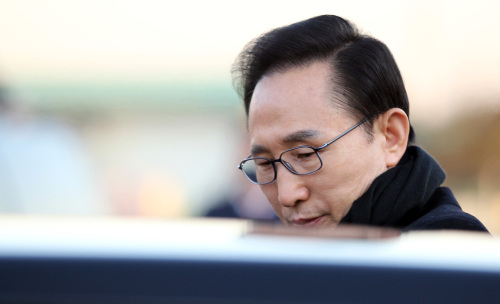Lee’s key policies falling apart or face uncertainties
By Korea HeraldPublished : Feb. 12, 2012 - 17:50
A series of President Lee Myung-bak’s achievements and pet projects have been marred as his political foes intensify their offensive against the conservative leader, who is already faltering under corruption scandals involving his close associates.
His key project to refurbish the country’s four major rivers and so-called “resource diplomacy” have lost some of their legitimacy as a local court has ruled against part of the rivers project and a stock-rigging scandal undermined the diplomatic initiatives.
As the president plunges deeper into his lame-duck status and the ruling Saenuri Party strives to shake off its corrupt image, the liberal opposition parties have highlighted what they call the ruling bloc’s ethical lapses ahead of the April 11 general elections.
Last Friday, a Busan court ruled that the project to dredge and construct weirs in the southern Nakdong River is illegitimate, as it proceeded without going through the required preliminary procedures, such as a feasibility study.
The ruling reignited the debate over the legitimacy of the entire 22 trillion won ($19.5 billion) project, which critics argue would seriously damage the rivers’ ecosystem. The government said that the project would help enhance water supply, flood management and ecological vitality.
Lee’s drive for resource diplomacy has been also been tarnished after allegations broke out last year that a Foreign Ministry official in charge of the project was involved in a 2010 stock manipulation scandal.
His key project to refurbish the country’s four major rivers and so-called “resource diplomacy” have lost some of their legitimacy as a local court has ruled against part of the rivers project and a stock-rigging scandal undermined the diplomatic initiatives.
As the president plunges deeper into his lame-duck status and the ruling Saenuri Party strives to shake off its corrupt image, the liberal opposition parties have highlighted what they call the ruling bloc’s ethical lapses ahead of the April 11 general elections.
Last Friday, a Busan court ruled that the project to dredge and construct weirs in the southern Nakdong River is illegitimate, as it proceeded without going through the required preliminary procedures, such as a feasibility study.
The ruling reignited the debate over the legitimacy of the entire 22 trillion won ($19.5 billion) project, which critics argue would seriously damage the rivers’ ecosystem. The government said that the project would help enhance water supply, flood management and ecological vitality.
Lee’s drive for resource diplomacy has been also been tarnished after allegations broke out last year that a Foreign Ministry official in charge of the project was involved in a 2010 stock manipulation scandal.

Prosecutors have been investigating him and other public servants, believing that they and their relatives illicitly used insider information to gain profits from purchasing stocks from a local firm, which got exclusive rights to develop a diamond mine in Cameroon in 2010.
Senior officials at the Prime Minister’s Office and other public corporations including former Vice Minister of Knowledge Economy Park Young-joon are purported to have been involved in the scandal. The public has become disenchanted, prompting calls for stricter discipline in officialdom.
The Lee administration’s efforts to effectuate the Korea-U.S. free trade pact also face challenges as the liberal parties led by the main opposition Democratic Unified Party vow to scrap it should disputed clauses not be renegotiated.
The Seoul government has promoted the agreement, saying it would create jobs, boost exports and further improve the long-standing ties with Washington.
However, the opposition argues that without revisions, the pact could encroach upon Korea’s economic sovereignty, while stressing that the ruling bloc railroaded its ratification through parliament last November.
Last Wednesday, the opposition parties sent a letter to the U.S. government in Seoul, in which they threatened to repeal the pact should the U.S. reject their demand for renegotiations.
The pact is expected to take effect later this month or early next month.
Amid all these developments, the president feels abashed over corruption scandals involving his close associates.
Last Friday, senior presidential secretary for political affairs Kim Hyo-jae offered to resign over allegations that he was involved in the ruling party’s high-profile vote-buying scandal.
Former National Assembly Speaker Park Hee-tae offered last week to resign amid ongoing investigations into the allegations that his aides offered money to fellow party members before the leadership contest in 2008. He still denies his involvement into it.
Also, former Korea Communications Commission Chairman Choi See-joong, dubbed Lee’s political mentor, resigned last month amid corruption allegations involving his former aide at the commission.
By Song Sang-ho (sshluck@heraldcorp.com)
-
Articles by Korea Herald

















![[KH Explains] Hyundai's full hybrid edge to pay off amid slow transition to pure EVs](http://res.heraldm.com/phpwas/restmb_idxmake.php?idx=652&simg=/content/image/2024/04/18/20240418050645_0.jpg&u=20240418181020)

![[Today’s K-pop] Zico drops snippet of collaboration with Jennie](http://res.heraldm.com/phpwas/restmb_idxmake.php?idx=642&simg=/content/image/2024/04/18/20240418050702_0.jpg&u=)